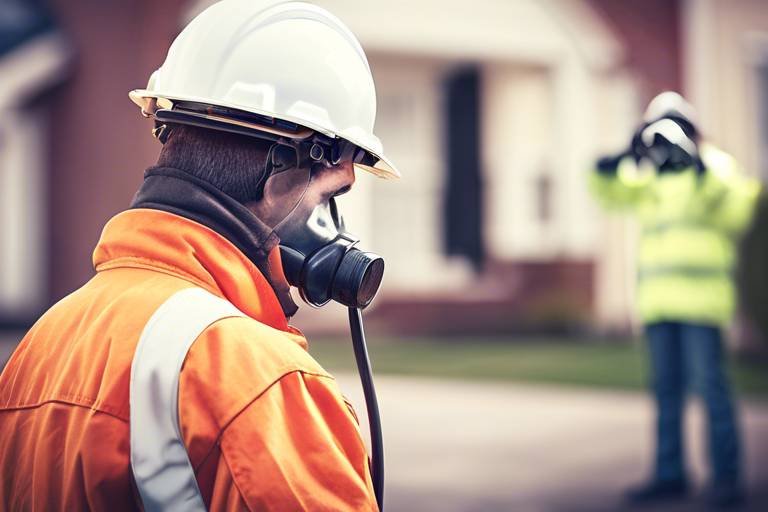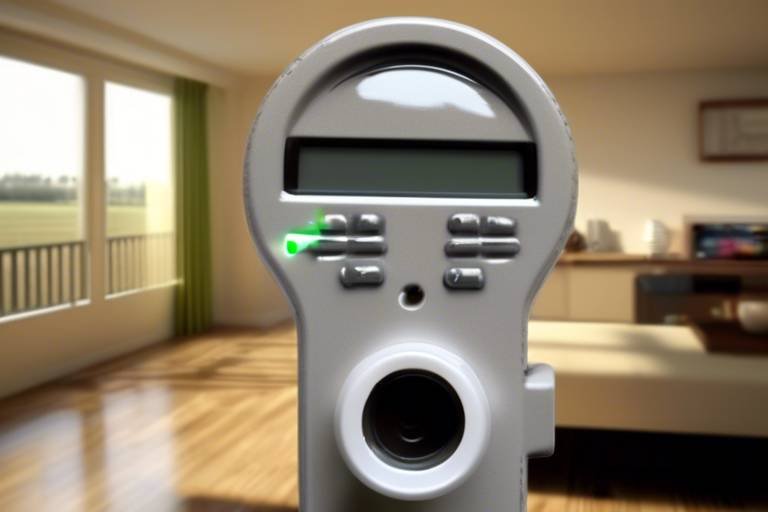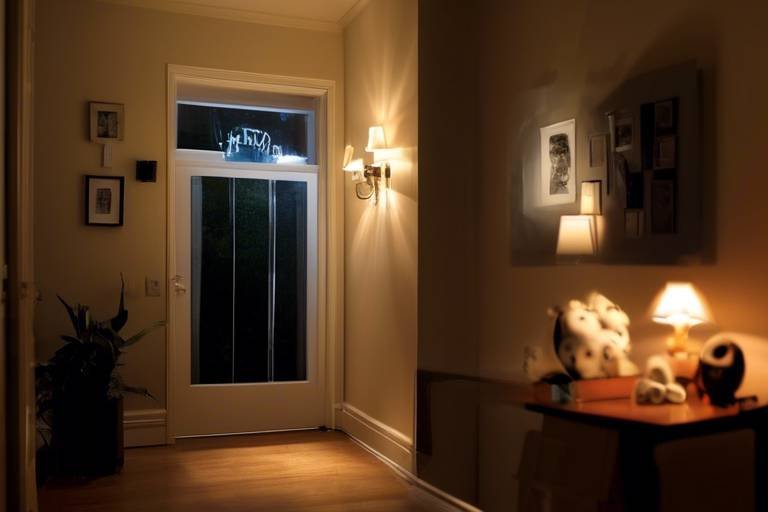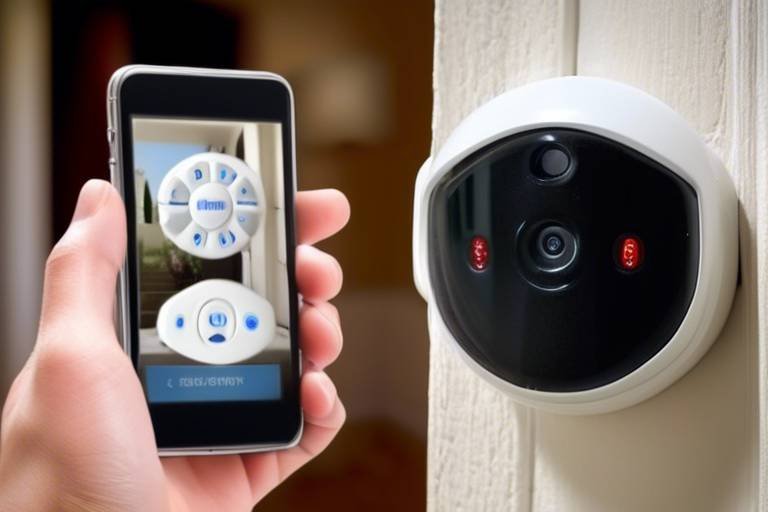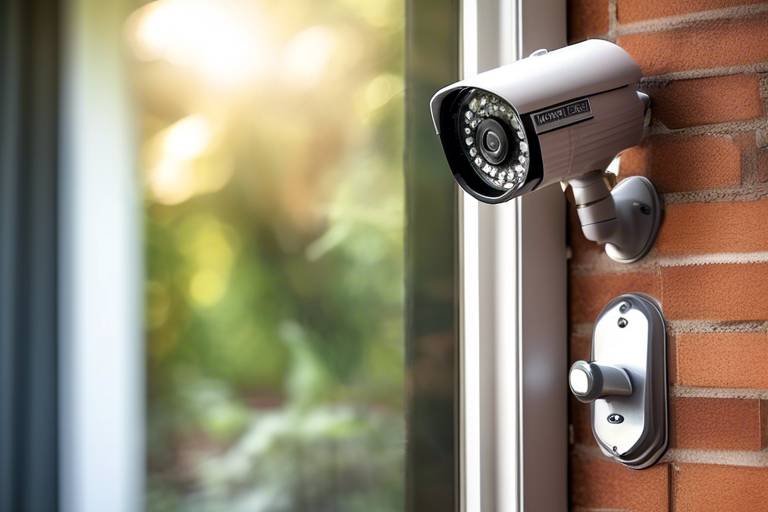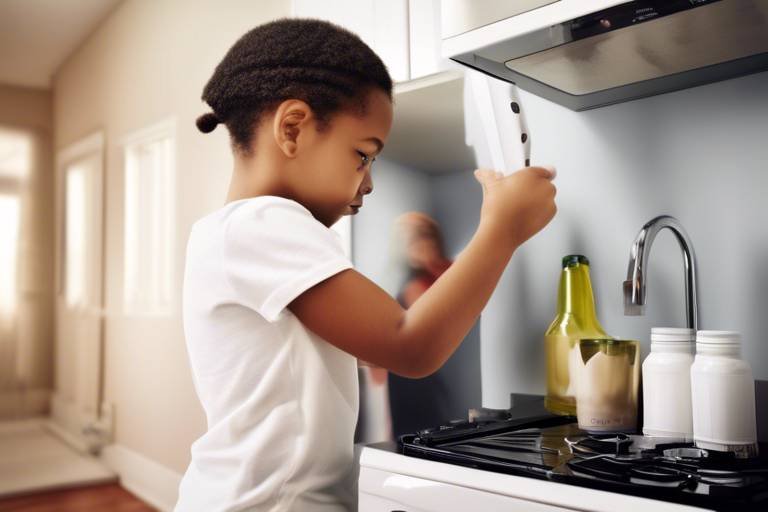Gas Leak Detection: Keeping Your Home Safe
In today's world, ensuring the safety of our homes is paramount, and one of the most critical aspects of home safety is gas leak detection. Gas leaks can happen unexpectedly, and their consequences can be dire. Imagine the horror of coming home to a gas leak; it’s not just a minor inconvenience—it can lead to serious health risks, explosions, or even loss of life. This article dives deep into the importance of detecting gas leaks, the technologies that make it possible, preventive measures you can take, and what to do in case of an emergency. By the end, you’ll be equipped with the knowledge to keep your home safe and secure.
So, what exactly is a gas leak? At its core, a gas leak occurs when natural gas escapes from its intended pipeline or appliance. This can happen for several reasons, including faulty appliances, corroded pipelines, or even natural disasters. The most common culprit is often the gas appliances we rely on daily, like stoves, heaters, and water heaters. The potential dangers associated with gas leaks are serious: they can lead to fires, explosions, and health issues such as headaches, nausea, or even asphyxiation. Understanding these risks is the first step in safeguarding your home.
Recognizing the signs of a gas leak is crucial for taking immediate action. Homeowners should be aware of several indicators that could signify a leak. These include:
- Smell: The most telling sign is often the smell of gas, which is typically described as a rotten egg odor due to the chemical added for detection.
- Sound: Listen for hissing or whistling noises near gas lines or appliances, which can indicate escaping gas.
- Visual Cues: Look for dead vegetation in your yard or a white cloud or mist near a gas line, which can indicate a leak.
Natural gas is inherently odorless, which makes it dangerous. To combat this, utility companies add a chemical called mercaptan, which gives gas its distinctive rotten egg smell. This addition is a lifesaver, making it easier for individuals to detect leaks before they escalate. If you ever catch a whiff of this smell, it’s essential to act quickly. Don’t ignore it; it could be the difference between safety and disaster.
In addition to smell, certain sounds can also indicate a gas leak. If you hear a hissing or whistling noise, it’s a clear sign that gas is escaping. Think of it like the sound of air escaping from a balloon—if you hear it, something is wrong. This sound often comes from the area of the gas line or appliance, so it’s crucial to pay attention to your surroundings.
As technology advances, so do the methods for detecting gas leaks. There are various devices and technologies designed to identify leaks early, ensuring safety and peace of mind for homeowners. From simple sensors to sophisticated alarms, these tools are essential in modern homes.
Portable gas detectors are a fantastic tool for homeowners. These devices can provide immediate feedback on the presence of gas in your home. They are typically compact and easy to use, making them perfect for everyday safety checks. When using a portable gas detector, it's essential to follow the manufacturer's instructions for optimal performance. Regular testing can help ensure your detector is functioning correctly.
In our tech-savvy world, integrating gas detection into your smart home system is a game-changer. Imagine receiving a notification on your phone while at work if there’s a gas leak at home. Smart gas detectors can alert you in real-time, allowing you to take action quickly, whether that means contacting emergency services or evacuating your home.
Preventing gas leaks is vital for maintaining a safe home environment. Regular maintenance and inspections of gas appliances and systems can significantly reduce the risk of leaks. Homeowners should consider implementing the following proactive measures:
- Schedule regular inspections with a qualified technician.
- Check for any visible signs of wear or damage on gas appliances.
- Ensure proper ventilation in areas where gas appliances are used.
Knowing how to respond in case of a gas leak can save lives. If you suspect a gas leak, the first step is to evacuate the area immediately. Do not attempt to find the source of the leak or turn on any lights, as a spark could ignite the gas. Once safely outside, contact emergency services from a safe distance. It's crucial to have a plan in place for your family so everyone knows what to do in case of an emergency.
Regular professional inspections are crucial for maintaining gas safety in your home. Experts can evaluate your gas systems to prevent leaks and ensure compliance with safety standards. Think of it like getting regular check-ups at the doctor; it’s better to be safe than sorry. Investing in professional inspections can save you from costly repairs and, more importantly, keep your loved ones safe.
Q: How can I tell if there’s a gas leak in my home?
A: Look for signs like a rotten egg smell, hissing sounds, or dead vegetation near gas lines. If you suspect a leak, evacuate immediately and contact emergency services.
Q: How often should I have my gas appliances inspected?
A: It’s recommended to have your gas appliances inspected at least once a year by a qualified technician.
Q: Can I use a portable gas detector for safety?
A: Yes! Portable gas detectors are an excellent tool for detecting gas leaks and can provide peace of mind for homeowners.

Understanding Gas Leaks
This article explores the importance of gas leak detection, the technology involved, preventive measures, and emergency responses to ensure safety in residential spaces.
Gas leaks can pose serious health risks and safety hazards, making it essential for homeowners to understand their nature and implications. A gas leak occurs when natural gas escapes from its intended pipeline or storage system, often due to damaged equipment, faulty installations, or wear and tear over time. The most common types of gases involved are natural gas, which is primarily methane, and propane. Both of these gases are used widely in homes for heating, cooking, and hot water. However, when they leak, they can create a dangerous environment.
The potential dangers associated with gas leaks are significant. Not only can they lead to explosions if ignited, but they can also cause suffocation or poisoning due to the displacement of oxygen in the air. In fact, according to the National Fire Protection Association (NFPA), gas leaks are responsible for numerous house fires and explosions each year, leading to injuries and fatalities. Understanding the common causes of gas leaks is vital for prevention:
- Corroded pipes: Over time, pipes can corrode, leading to leaks.
- Faulty appliances: Improperly installed or malfunctioning gas appliances can be a significant source of leaks.
- Natural wear and tear: Just like any other system in your home, gas lines can deteriorate with age.
- Earthquakes or ground movement: Natural disasters can shift pipes, causing them to break or loosen.
Recognizing these risks is the first step toward ensuring a safe living environment. Homeowners should be proactive in monitoring their gas systems and appliances. Regular maintenance and inspections can help identify potential issues before they become serious problems. Additionally, being aware of the signs of a gas leak can save lives. It's essential to educate yourself and your family about these dangers, ensuring that everyone knows what to look for and how to respond in case of an emergency.
In summary, understanding gas leaks is crucial for maintaining safety in your home. By being aware of the causes, potential dangers, and preventive measures, you can significantly reduce the risks associated with gas leaks. Always prioritize safety and consider professional inspections to keep your gas systems in check.
Q: What should I do if I suspect a gas leak?
A: If you suspect a gas leak, immediately evacuate the area and avoid using any electrical devices or open flames. Once you are at a safe distance, contact your gas provider or emergency services.
Q: How can I tell if I have a gas leak?
A: Common signs of a gas leak include a rotten egg smell (due to the odorant added to natural gas), hissing sounds near gas lines, and dead or discolored vegetation near gas pipelines.
Q: How often should I have my gas appliances inspected?
A: It's recommended to have your gas appliances inspected annually by a qualified professional to ensure they are functioning safely and efficiently.

Signs of a Gas Leak
Recognizing the signs of a gas leak is crucial for ensuring the safety of your home and loved ones. Gas leaks can be insidious, often going undetected until they become a serious threat. So, what should you be on the lookout for? There are several key indicators that can help you identify a potential gas leak before it escalates into a dangerous situation.
One of the most obvious signs is the smell of gas. Natural gas is typically odorless, but utility companies add a substance called mercaptan to give it a distinctive, sulfur-like odor, often compared to rotten eggs. If you ever catch a whiff of this unpleasant scent, it’s vital to take immediate action. Even if the smell is faint, don’t ignore it! It’s better to be safe than sorry.
The addition of mercaptan is a lifesaver when it comes to detecting gas leaks. This strong odor is designed to alert you long before the situation becomes critical. If you smell gas, you should:
- Evacuate the area immediately.
- Avoid using any electrical switches or devices.
- Do not light matches or flames.
- Contact your gas company or emergency services from a safe distance.
But smell isn’t the only indicator. Sometimes, you might hear sounds that suggest a gas leak is occurring. For instance, a hissing or whistling noise near gas lines or appliances can indicate that gas is escaping. It’s like hearing a warning bell ringing in your ear—something isn’t right! If you hear such sounds, it’s essential to investigate further, ensuring you prioritize safety first.
In addition to smell and sound, you should also look for visual cues. For example, if you notice dead or dying vegetation in an otherwise healthy area, it could be a sign of a gas leak. Gas can seep into the soil and affect plant life, leading to wilting or discoloration. Think of it as nature's way of signaling that something is amiss. Furthermore, you might observe bubbles in standing water or a white cloud near gas lines, both of which are indicators of a leak.
In summary, being aware of the signs of a gas leak is your first line of defense. The combination of smell, sound, and visual indicators can help you detect a leak early, allowing you to take the necessary precautions. Always trust your instincts—if something feels off, it probably is. Your safety and the safety of those around you depend on your vigilance.
Q1: What should I do if I smell gas?
A1: If you smell gas, evacuate the area immediately, avoid any electrical devices, and contact your gas company or emergency services from a safe distance.
Q2: How can I prevent gas leaks in my home?
A2: Regular maintenance of gas appliances, installing detectors, and scheduling professional inspections can help prevent gas leaks.
Q3: Are gas leaks dangerous?
A3: Yes, gas leaks can lead to explosions, fires, and health issues. It’s crucial to address any suspected leaks immediately.
Q4: What is mercaptan?
A4: Mercaptan is a chemical added to natural gas to give it a distinctive odor, making it easier to detect leaks.

Odor Detection
When it comes to detecting gas leaks, one of the most effective and immediate indicators is the odor associated with natural gas. To make this detection possible, a substance called mercaptan is added to the otherwise odorless natural gas. This compound gives gas its distinctive smell, often described as similar to that of rotten eggs or sulfur. The pungent odor is intentionally designed to alert homeowners to the presence of gas, allowing for swift action to mitigate potential hazards.
Imagine walking into your home and suddenly catching a whiff of something unpleasant—your instincts kick in, and you know something isn’t right. This is the beauty of odor detection in gas safety. The strong smell serves as a warning signal, urging you to investigate further. But what should you do if you detect this alarming scent? First and foremost, it’s essential to remain calm and take immediate action. Do not ignore the smell or assume it’s just a minor issue. Instead, treat it with the seriousness it deserves.
In addition to the smell, there are other factors to consider when it comes to odor detection. For instance, if you notice the odor becoming stronger in a specific area of your home, it could indicate a localized leak. Ventilation plays a crucial role here; if the gas is not adequately dispersed, it can accumulate and pose a significant risk. Therefore, knowing how to react when you detect this telltale odor is vital for your safety and the safety of your family.
Furthermore, it’s important to understand that not everyone may have the same sensitivity to the smell of gas. Some individuals may have a reduced ability to detect odors due to age, health conditions, or even certain medications. This variability highlights the importance of having additional safety measures in place, such as gas detectors, which can provide an extra layer of security in your home.
In conclusion, the addition of mercaptan to natural gas is a critical safety feature that empowers homeowners to detect leaks before they escalate into dangerous situations. By understanding the significance of this odor and responding promptly, you can help ensure a safer living environment for you and your loved ones.

Sound Indicators
When it comes to detecting gas leaks, can be just as crucial as smell. Imagine sitting in your living room, enjoying a quiet evening, when suddenly you hear a faint hissing noise. This sound could be your first warning sign of a gas leak! Understanding what these sounds mean can help you take immediate action and potentially save lives.
Gas leaks often produce a variety of sounds, but the most common ones are hissing or whistling noises. These sounds occur when gas escapes from a pipe or appliance, creating pressure that causes the gas to flow rapidly. It’s like the sound of air escaping from a balloon, only much more serious. If you hear any unusual noises coming from your gas appliances or pipelines, it’s essential to investigate further.
Here are some common sounds associated with gas leaks:
- Hissing: This sound typically indicates that gas is escaping from a small opening, such as a crack in a pipe or a loose connection. If you hear this sound, it’s a clear sign that something is wrong.
- Whistling: Similar to hissing, a whistling sound can indicate that gas is escaping at a higher pressure. This sound might be more noticeable if you’re near the source of the leak.
- Clicking or popping: If you hear clicking or popping noises coming from your gas appliances, it could indicate a malfunction or a potential gas leak. These sounds should never be ignored.
It’s important to remember that not all gas leaks will produce noticeable sounds. Some might be silent but deadly, so relying solely on auditory cues isn’t enough. However, if you do hear any of these sounds, it’s crucial to take immediate action. Turn off your gas supply, evacuate the area, and contact emergency services or a qualified technician.
In summary, being aware of the associated with gas leaks can be a game changer in ensuring your home’s safety. Just like a smoke alarm alerts you to danger, these sounds can serve as your early warning system. By staying vigilant and responsive to these auditory cues, you can help protect yourself and your loved ones from the dangers of gas leaks.

Gas Leak Detection Technologies
In today's world, where safety is paramount, have become essential in protecting our homes and loved ones. These advanced systems not only help in early detection of gas leaks but also ensure peace of mind for homeowners. Imagine a silent guardian that watches over your home, alerting you at the first sign of danger. This is the reality of modern gas detection technologies.
There are several methods and devices designed to detect gas leaks effectively. Traditional methods, while still in use, have evolved significantly. Now, we have a range of innovative solutions that combine technology with practicality. From simple sensors to complex smart home integrations, the landscape of gas leak detection is diverse and fascinating.
One of the most common tools in a homeowner's arsenal is the portable gas detector. These handy devices can be easily carried around the house, making it possible to check for gas leaks in various locations. They work by sampling the air and providing immediate feedback on the presence of hazardous gases. The advantages of portable gas detectors include:
- Quick and easy to use
- Battery-operated for convenience
- Real-time alerts for immediate action
Using a portable gas detector is straightforward. Simply turn it on, allow it to calibrate, and then move it around areas where gas leaks are most likely to occur, such as near gas appliances or pipelines. If the device detects gas, it will emit a loud alarm, giving you the chance to take action.
Another exciting development in gas leak detection is the integration of these systems into smart home technology. Imagine receiving an alert on your smartphone while you're at work, notifying you of a potential gas leak at home. Smart gas detectors connect to your home Wi-Fi and can send real-time notifications directly to your devices. This technology not only enhances safety but also allows for remote monitoring, which is particularly useful for busy families or those who travel frequently.
In addition to these technologies, there are also fixed gas detection systems that can be installed in homes. These systems are designed to monitor specific areas continuously and can be linked to home alarm systems. When a leak is detected, they trigger an alarm and can even notify emergency services, ensuring that help is on the way. Understanding the various technologies available empowers homeowners to make informed decisions about their safety.
To summarize, the landscape of gas leak detection technologies is rich with options that cater to different needs and preferences. From portable detectors to smart home integrations, these tools significantly enhance our ability to detect gas leaks early and mitigate potential dangers. Investing in these technologies is not just a choice; it's a necessity for a safe living environment.

Portable Gas Detectors
When it comes to ensuring the safety of your home, are invaluable tools that provide immediate feedback on the presence of hazardous gases. Imagine having a reliable companion that can alert you to danger before it becomes a serious threat. These devices are designed to be user-friendly and can be easily carried around, making them perfect for both residential and commercial use. But how exactly do they work, and why should you consider investing in one?
Portable gas detectors are equipped with advanced sensors that can detect various types of gases, including natural gas, propane, and carbon monoxide. The technology behind these detectors is quite fascinating. Most devices utilize electrochemical sensors or infrared sensors to identify gas concentrations in the air. When a gas leak occurs, the sensor detects the gas and triggers an alarm, alerting you to take immediate action.
One of the key advantages of portable gas detectors is their versatility. They can be used in multiple settings, from kitchens to garages, ensuring that you are always aware of your environment. Here are some features that make these devices stand out:
- Real-Time Monitoring: Many portable gas detectors provide continuous monitoring, giving you real-time data on gas levels.
- Compact Design: Their lightweight and compact design makes them easy to carry around, so you can use them wherever you need.
- Audible and Visual Alarms: Most detectors come with both sound and light alarms, ensuring that you won’t miss a warning.
- Battery Operated: Many models are battery-operated, making them reliable even during power outages.
Using a portable gas detector is straightforward. Simply turn it on and allow it to calibrate. Most units will take a few moments to warm up and begin monitoring the air for gas concentrations. It’s essential to regularly test your device to ensure it is functioning correctly. A simple push of a button can activate the self-test feature, providing peace of mind that your safety equipment is in top shape.
In addition to personal safety, portable gas detectors can also be a wise investment for landlords and property managers. By having these devices on hand, you can quickly check for leaks in various appliances and systems, ensuring that your tenants are safe and that you are compliant with safety regulations. It’s a win-win situation for everyone involved!
In conclusion, portable gas detectors are more than just gadgets; they are essential safety tools that can help prevent dangerous situations in your home or workplace. With their advanced technology and ease of use, they empower you to take control of your safety. So, why wait? Consider adding a portable gas detector to your safety arsenal today!

Smart Home Integration
In today's rapidly evolving world, the concept of a smart home is becoming increasingly popular, and for good reason. Integrating gas leak detection systems into your smart home setup not only enhances safety but also provides peace of mind. Imagine being able to monitor your home’s gas levels from anywhere, at any time, right from your smartphone. This level of connectivity allows homeowners to act swiftly in case of a gas leak, potentially saving lives and preventing catastrophic damage.
Smart home integration works by utilizing advanced sensors that detect gas leaks and communicate with your home automation system. When a leak is detected, these sensors can trigger alarms, send notifications to your smartphone, and even shut off the gas supply automatically. This proactive approach is crucial because it minimizes the risk of an explosion or fire, which can occur when gas accumulates in a confined space.
Moreover, many modern smart home systems offer real-time monitoring. This means you can receive instant alerts about any irregularities in your gas levels, allowing you to take immediate action. Some systems even allow for remote control of gas appliances, ensuring they can be turned off promptly in case of an emergency. Imagine being at work and receiving an alert about a potential gas leak at home; you can quickly contact emergency services or a neighbor to check on your property.
Additionally, integrating gas leak detection with your smart home can enhance overall energy efficiency. By monitoring gas usage, homeowners can identify unusual spikes in consumption, which could indicate a leak or malfunctioning appliance. This not only helps in maintaining safety but also in saving on energy bills.
It's important to choose the right equipment that is compatible with your existing smart home ecosystem. Many brands offer sensors and alarms that seamlessly integrate with platforms like Google Home, Amazon Alexa, or Apple HomeKit. When selecting a system, consider factors such as response time, sensor sensitivity, and whether it provides a backup battery in case of a power outage. A well-designed smart home gas detection system can be a game-changer in ensuring your home remains a safe haven.
In conclusion, the integration of gas leak detection into smart home technology is not just a luxury but a necessity in today’s world. It empowers homeowners with the tools they need to protect their families and properties from the hidden dangers of gas leaks. So, if you haven’t yet considered upgrading your home with these smart technologies, now might be the perfect time to take that leap into a safer, more connected living space.
- What should I do if I suspect a gas leak? If you suspect a gas leak, evacuate the area immediately and contact your local gas company or emergency services.
- How often should I test my gas detectors? It's recommended to test your gas detectors monthly and replace them every 5-7 years, depending on the manufacturer's guidelines.
- Can I integrate gas leak detection with my existing smart home system? Yes, many gas leak detectors are designed to work with popular smart home platforms, making integration seamless.
- What are the signs of a gas leak? Common signs include a distinct smell (often compared to rotten eggs), hissing sounds near gas lines, and dead vegetation around your home.

Preventive Measures
When it comes to ensuring the safety of your home, against gas leaks are your first line of defense. Just like a sturdy lock on your door keeps intruders out, taking proactive steps can help keep your family safe from the dangers of gas leaks. So, what can you do? Well, it all starts with regular maintenance and inspections of your gas appliances and systems. Think of these actions as a routine health check-up for your home – it’s essential for long-term safety.
First and foremost, you should schedule annual inspections with a qualified technician. These experts can identify potential issues before they escalate into serious problems. During these inspections, they will check for leaks, ensure proper ventilation, and assess the functionality of your gas appliances. Just like how you wouldn’t skip a doctor’s appointment, don’t overlook this critical step for your home.
In addition to professional inspections, it’s equally important to perform regular self-checks on your gas appliances. Look for any signs of wear and tear, such as frayed hoses or rusted connections. If something seems off, don’t hesitate to call in a professional. Remember, a small problem today could turn into a big headache tomorrow.
Another effective preventive measure is to install carbon monoxide detectors in your home. These devices are crucial because they can detect the presence of this colorless, odorless gas, which is a byproduct of incomplete combustion. Placing them near sleeping areas ensures that you and your family are alerted in case of a leak during the night. Just like a smoke detector, this is a small investment that can save lives.
Moreover, staying informed about your gas appliances is vital. Familiarize yourself with the manufacturer’s guidelines for installation and maintenance. If you’re ever in doubt, consult the manual or reach out to the manufacturer for advice. Knowledge is power, and understanding how your appliances work can help you spot potential issues before they become dangerous.
Let’s not forget about the importance of proper ventilation. Ensure that your home has adequate airflow, especially in areas where gas appliances are used. Poor ventilation can lead to dangerous build-ups of gas, so keeping those airways clear is essential. Think of it as opening a window to let fresh air in; it’s a simple yet effective way to maintain a safe environment.
Lastly, educate your family about the signs of a gas leak. Make it a family affair to discuss what to look out for, such as the smell of rotten eggs or unusual hissing sounds. By fostering an environment of awareness, you can empower everyone in your household to act quickly if they suspect a leak. Knowledge is a powerful tool, and in this case, it could save lives.
In summary, taking preventive measures against gas leaks is not just about being cautious; it’s about being proactive. With regular inspections, self-checks, proper ventilation, and family education, you can create a safer home environment. Remember, safety is a shared responsibility, and by working together, you can significantly reduce the risks associated with gas leaks.
- How often should I have my gas appliances inspected? It is recommended to have them inspected at least once a year.
- What should I do if I smell gas? Evacuate the area immediately and call your gas company or emergency services.
- Can I detect gas leaks myself? While you can perform self-checks, professional inspections are crucial for thorough assessments.
- What type of detector should I install? Install both carbon monoxide detectors and natural gas detectors for comprehensive safety.

Emergency Response to Gas Leaks
When it comes to gas leaks, time is of the essence. Knowing how to respond effectively can mean the difference between a minor inconvenience and a catastrophic event. The first step in any emergency response is to remain calm. Panic can cloud judgment and lead to poor decisions. If you suspect a gas leak, the first thing you should do is to evacuate the area immediately. Ensure that all occupants, including pets, are safely outside and away from the building. This is not the time to gather belongings or figure out what to do next; your safety is the top priority.
Once you are at a safe distance, it’s crucial to contact emergency services or your gas utility provider. Use your mobile phone only if you are at a safe distance from the suspected leak. Avoid using any electrical devices inside the building, as they could create a spark and ignite the gas. It’s also important to avoid open flames, such as matches or lighters, which could trigger an explosion.
In the event of a gas leak, you might notice some common signs that indicate the severity of the situation. For instance, if you hear a hissing or whistling sound, it might mean that gas is escaping from a pipe or appliance. If you see a visible cloud or mist near gas lines or appliances, it’s a clear indicator of a leak. In such cases, do not attempt to investigate the source of the leak yourself. Instead, keep your distance and inform the professionals when they arrive.
Here’s a quick checklist to remember during a gas leak emergency:
- Evacuate the area immediately.
- Do not use electrical devices or create any sparks.
- Contact emergency services from a safe location.
- Do not re-enter the building until authorities declare it safe.
After the authorities have been notified, they will assess the situation and determine the necessary steps to address the leak. This may include shutting off the gas supply, venting the area, or conducting repairs. It’s essential to follow their instructions carefully and remain at a safe distance until the situation is resolved.
In conclusion, being prepared for a gas leak emergency is vital for ensuring your safety and the safety of your loved ones. Familiarize yourself with the signs of a gas leak, have a clear evacuation plan, and know who to contact in case of an emergency. This preparedness can help you respond swiftly and effectively, minimizing the risks associated with gas leaks.
Here are some common questions regarding emergency responses to gas leaks:
| Question | Answer |
|---|---|
| What should I do if I smell gas? | Evacuate the area immediately and contact emergency services from a safe distance. |
| Can I use my phone during a gas leak? | Only use your phone once you are at a safe distance from the suspected leak. |
| How can I prevent gas leaks? | Regular maintenance and inspections of gas appliances can help prevent leaks. |

Importance of Professional Inspections
When it comes to ensuring your home is safe from gas leaks, professional inspections play a crucial role. Many homeowners might think that a quick visual check of their gas appliances is sufficient, but the reality is that gas systems can be complex and often hide potential issues that are not immediately visible. Regular inspections by certified professionals are essential for identifying these hidden dangers and ensuring that your gas systems are functioning correctly.
One of the primary benefits of professional inspections is the expertise that trained technicians bring to the table. These professionals are equipped with specialized knowledge and tools that allow them to detect issues that an untrained eye might miss. For instance, they can measure gas pressure, check for leaks in pipes, and assess the overall integrity of your gas appliances. This level of scrutiny is vital because even a minor leak can lead to catastrophic consequences if left unchecked.
Moreover, professional inspections help in maintaining compliance with safety standards. Gas safety regulations can vary by region, and keeping up with these standards is crucial for both safety and legal reasons. A qualified technician will not only ensure that your systems meet local codes but also provide you with documentation that can be invaluable for insurance purposes or when selling your home.
Another important aspect of professional inspections is the preventive maintenance they provide. During an inspection, technicians can identify wear and tear on components, suggest necessary repairs, and even recommend upgrades to more efficient systems. This proactive approach not only enhances safety but can also save homeowners money in the long run by avoiding costly repairs or replacements due to neglected maintenance.
In addition to these benefits, regular inspections can also give homeowners peace of mind. Knowing that a professional has thoroughly evaluated your gas systems allows you to rest easy, confident that your home is safe. After all, the last thing you want is to be caught off guard by a gas leak that could have been prevented with a simple inspection.
To summarize, the importance of professional inspections cannot be overstated. They not only help in identifying potential hazards but also ensure compliance with safety regulations and contribute to the longevity of your gas systems. Investing in regular professional inspections is a small price to pay for the safety and security of your home and loved ones.
- How often should I have my gas appliances inspected? It's recommended to have your gas appliances inspected at least once a year to ensure they are functioning properly and safely.
- What should I do if I suspect a gas leak? If you suspect a gas leak, immediately evacuate the area, avoid using electrical devices, and contact your local emergency services.
- Can I perform my own gas inspection? While you can perform basic visual checks, it's best to leave detailed inspections to professionals who have the right tools and training.
Frequently Asked Questions
- What should I do if I smell gas in my home?
If you smell gas, it's crucial to act quickly. First, do not turn on any electrical devices or use a flame. Evacuate everyone from the house immediately and avoid using any phones inside the home. Once you’re at a safe distance, call your gas company or emergency services to report the leak.
- How can I detect a gas leak in my home?
There are several ways to detect a gas leak. The most common method is through the distinctive smell of natural gas, which is often described as similar to rotten eggs. Additionally, listen for hissing or whistling sounds near gas lines or appliances, and look for dead vegetation or bubbles in standing water near gas lines.
- Are portable gas detectors effective?
Absolutely! Portable gas detectors are designed to provide real-time feedback on the presence of gas. They are effective tools for homeowners, as they can detect leaks quickly and alert you to potential dangers. Regularly testing and maintaining these devices ensures they function properly.
- How often should I have my gas appliances inspected?
It's recommended to have your gas appliances inspected at least once a year. Regular inspections by a qualified professional can help identify potential issues before they become serious problems, ensuring your home remains safe and compliant with safety standards.
- Can smart home technology help with gas leak detection?
Yes! Integrating gas detection systems into your smart home technology can significantly enhance safety. Smart detectors can send alerts to your smartphone in real-time, allowing you to take immediate action even when you're not at home.
- What are the signs of a gas leak?
Common signs of a gas leak include a rotten egg smell, hissing sounds near gas lines, and physical symptoms like dizziness or headaches among occupants. If you notice any of these signs, it’s essential to take action immediately.
- What should I do after a gas leak is detected?
After a gas leak is detected, evacuate the area and contact your gas provider or emergency services. Do not return to the property until professionals have confirmed it is safe. Once the situation is resolved, consider having a professional inspect your gas system to prevent future leaks.

